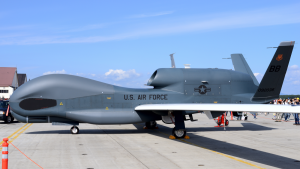Amidst macroeconomic uncertainty, equity markets are providing an excellent opportunity to consider exposure to some of the best defense stocks to buy.
World military expenditure increased by 3.7% on a year-on-year basis for 2022 to $2.2 trillion. An increase in geopolitical tensions in Europe was a key catalyst for defense spending growth.
Considering the different points of friction globally, it’s likely that defense spending will continue to increase. My focus in this column is on two established companies in the defense sector.
These are attractive defense dividend stocks that also look poised for healthy capital gains. I have discussed one defense growth stock that might make it big in the next five years.
It’s also worth mentioning that be it growth or blue-chip stocks, the sector is immune to recessions. Even during the pandemic year, global defense spending increased. Given the possibility of a recession in 2023, it makes sense to hold few of the best defense stocks in the portfolio.
Let’s discuss three defense stocks to buy for the long-term portfolio.
| LMT | Lockheed Martin | $469.64 |
| DRS | Leonardo DRS | $15.20 |
| NOC | Northrop Grumman | $461.33 |
Lockheed Martin (LMT)

Lockheed Martin (NYSE:LMT) is my top pick from defense stocks to buy for the long-term portfolio.
LMT stock has been in an uptrend with returns of 7.8% in the last 12 months. The stock provides a dividend yield of 2.58%. It’s also worth noting that LMT stock trades at a forward price-earnings ratio of 17.2. Considering the valuation and the order backlog position, I expect a meaningful rally from current levels.
As of March 2023, Lockheed reported an order backlog of $145 billion. For April, the company reported an order intake of $5.8 billion. With the order intake remaining robust, there is clear revenue and cash flow visibility. I therefore expect dividend growth to sustain in the coming years.
Lockheed Martin has also been investing in new technology. This includes hypersonics and mission-based technology. With U.S. and Europe being key markets, there is headroom for growth and value creation.
Leonardo DRS (DRS)

If we scan for defense growth stocks, Leonardo DRS (NASDAQ:DRS) stock seems to be the best. The emerging defense stock has delivered returns of 34% in the last six months. However, DRS stock remains attractive at a forward PE of 23.2.
As an overview, Leonardo DRS is a provider of defense products and technology. This includes advance sensing, network computing, force protection, and electric power & propulsion. For 2023, the company has guided for revenue of $2.75 billion and a potential EBITDA of $323 million.
There are two important points to note from a growth perspective. First, Leonardo reported a backlog of $4.3 billion as of December 2022. On a year-on-year basis, the backlog swelled by 49%. A strong backlog provides growth visibility.
Leonardo reported net leverage ratio of 0.3. The company has strong financial flexibility to invest in product development and potential acquisition driven growth.
Northrop Grumman (NOC)

Northrop Grumman (NYSE:NOC) stock looks attractive among blue-chip defense stocks to buy. The 1.5% dividend yield stock trades at an attractive forward price-earnings ratio of 20.4. With the company reporting strong Q1 2023 earnings, I expect NOC stock to trend higher from current levels.
For Q1, Northrop reported sales of $9.3 billion. On a year-on-year basis, sales increased by 6%. It’s worth noting that the company ended Q1 with an order backlog of $77.5 billion. This provides clear revenue and cash flow visibility.
This will ensure sustained shareholder value creation. For Q1, Northrop spent $1 billion on dividend and share repurchase.
Further, for Q1, the order in take was $8 billion. Given the geopolitical scenario, it’s likely that the order intake will remain strong in the coming quarters. In terms of growth drivers, the space systems segment reported 17% growth in sales on a year-on-year basis.
On the date of publication, Faisal Humayun did not hold (either directly or indirectly) any positions in the securities mentioned in this article. The opinions expressed in this article are those of the writer, subject to the InvestorPlace.com Publishing Guidelines.
